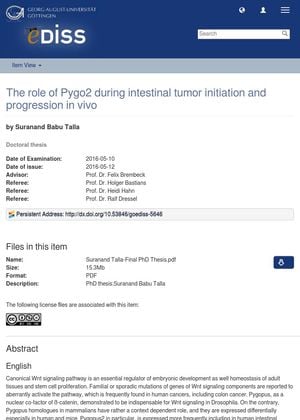The Role of Pygo2 During Intestinal Tumor Initiation and Progression In Vivo
January 2016

TLDR Pygo2 is important for early growth and progression of intestinal tumors, and could be a target for treating cancers with certain mutations.
The study investigates the role of Pygo2, a nuclear co-factor of ß-catenin, in intestinal tumorigenesis. The data shows that Pygo2 is not necessary for Wnt signaling in normal intestinal epithelium or for epithelial regeneration after intestinal inflammation. However, Pygo2 is required for early intestinal hyperproliferation induced by stabilized ß-catenin, as its knockout blocked specific upregulated Wnt target genes and rescued the intestinal hyperproliferation in ß-catenin mutant mice. Pygo2 knockout also reduced the size and number of colon tumors in chemically induced cancer models and downregulated Wnt target gene expression in a subgroup of these tumors. Interestingly, Pygo2 knockout completely downregulated c-myc only in ß-catenin mutants but not in APC mutants and chemically induced tumor models. The study concludes that Pygo2 plays a significant role in early intestinal hyperproliferation and tumor progression, suggesting that targeting Pygo2 in cancers with ß-catenin mutation could be a potential therapeutic strategy to inhibit tumor growth.




